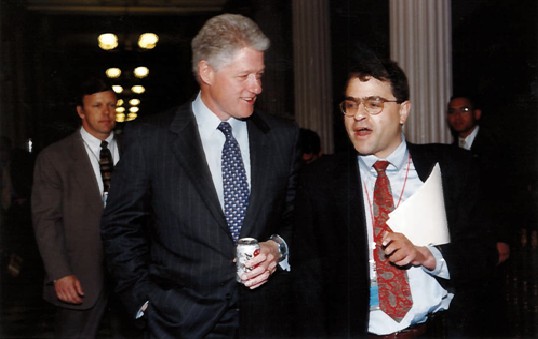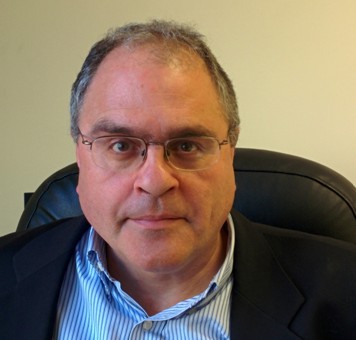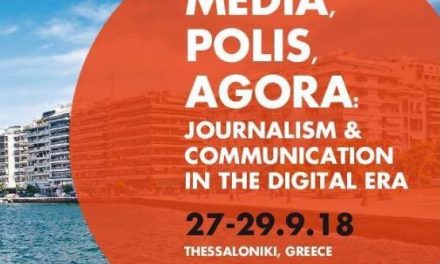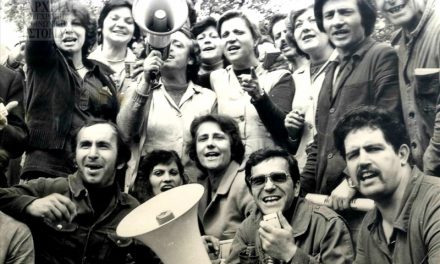Paul Glastris is a journalist and political columnist. Glastris is the current editor in chief of The Washington Monthly and was President Bill Clinton’s chief speechwriter from September 1998 to the end of his presidency in early 2001. He wrote over 200 speeches for the President, including the education sections of the 1999 and 2000 State of the Union addresses and the President’s signing remarks for the 1998 Higher Education Act reauthorization. He also co-wrote the president’s address to the Democratic convention in Los Angeles in August 2000.
In November 1999, Glastris traveled with President Clinton to Turkey and Greece and co-wrote the President’s landmark address to the Greek people. Glastris also co-founded the President’s “DC Reads This Summer” program, which has placed over 1,000 federal employees as volunteer reading tutors in Washington, DC public schools. He also promoted several administration policy initiatives, including a new food stamp rule that allowed the working poor to own cars.
Before joining the White House, Glastris spent 10 years as a correspondent and editor at U.S. News & World Report. There, he conceived of and edited two end-of-the-year issues consisting of “solutions-oriented” journalism (1997 and 1998). As Bureau Chief in Berlin, Germany (1995-1996), he covered the former Yugoslavia during the final months of the Bosnian War and wrote stories from Germany, Russia, Greece, and Turkey. Prior to that, he covered the Midwest from the magazine’s Chicago bureau during two presidential campaigns, the Mississippi floods of 1993, and the rise of the Michigan Militia. He produced profiles of Midwest mayors, governors, and other personalities, from Jesse Jackson to then-presidential candidate Bill Clinton.
From 1985 to 1986, Paul Glastris was an editor of the Washington Monthly. He has also written for The New York Times, the Washington Post, The New Republic, Slate, and other publications. Glastris has been a fellow at New America and the Western Policy Center, serves on the board on the Nonzero Foundation and was a founding member of the board of Education Sector, a nonpartisan think tank in Washington, DC. He is a regular commentator on the BBC and has been a guest commentator on CNN, MSNBC, NPR, the Colbert Report, and the McLaughlin Group. He holds a bachelor’s degree in history and a master’s in radio, TV, and film from Northwestern University. Glastris granted an interview* to Greek News Agenda regarding his remarkable career and the contributions of the Greek diaspora in the American society.
Last year you received the Hellenic Heritage National Public Service Award for important career achievements and contributions to the Greek American community or community at-large and of course you are a well-recognized figure of the Greek Diaspora in Washington DC and beyond. What does it mean to you to be a recognized and awarded figure of Greek heritage in the US?
It’s an incredible honor. I could be recognized by any number of groups but none would make me feel more proud than to be recognized by Greek-Americans.
Could you highlight your major achievements as a journalist and publisher?
I think in general the magazine Washington Monthly has had a real impact on the actual policies and debates of the US government in a number of areas. Probably most profound has been in the reform of America’s college and university system. Since 2005 we have published an annual college ranking that is an alternative to the dominant US News & World Report ranking. Whereas US News rewards colleges for their prestige, money and reputation, The Washington Monthly reward colleges for providing students a chance for upward mobility, for providing research and new ideas to fuel the economy and human flourishing, and for promoting public service. It’s just a very different way of evaluating these institutions and it had a very profound impact. For instance, a regulation that came out of the Obama White House that limited the role of predatory for-profit colleges was a result of some of our investigative work. The new data that the U.S. Department of Education started putting out a few years ago measuring the outcomes of the university degrees in terms of earnings and ability to pay back loans, was a direct consequence of our rankings. So we are very proud of that. We’ve had impact on a number of other areas too, from health care to the economy, to national security.
So you are saying that your ranking system is friendlier for low income students?
Our rankings reward colleges that do an excellent job of providing average students with a quality education that means something in the market place. We do not reward schools that cherry-pick the brightest and wealthiest students and lavish a lot of attention on them. That’s what US News does, which is a self-reinforcing prestige machine that accelerates the inequality and elitism in the American education system. That educational elitism spills over to the entire economy and society and contributes to the horrible inequality that is driving the country into a ditch. We think it’s a terrible mistake for our educational establishment to have that model of “quality”, that idea of what, “excellence” is, be the thing that drives the careers of college presidents and other administrators. It would be much better if the people who run our education system were given credit for doing a great job of educating the students they have and not the students they wished they had, a great job of educating the average student, the poor student, the striving student who wants to move up in the world.
This is the majority of the students actually.
Yes, 90% of them. The top hundred most selective colleges and universities in the country probably educate 5 or 10% of all college students. There are thousands of colleges out there that will never be recognized in the top hundred in US News report but in ours they are recognized.
So it’s a small revolution I would say.
Yes it’s a revolution we started in the mid-2000s and the rest of the world has caught up with. We, in the Washington Monthly, are kind of scouts, we go over the horizon looking for the problems and the solutions that Washington ought to be talking about, but isn’t. We focus on the longer term deeper trends that others, caught up in the day to day of a news cycle, don’t have time to look at carefully. And we constantly try to inject into the policy and political discussion issues and ideas that really matter.
Here’s another example of a subject that we were uniquely at the forefront of covering. For the last decade we’ve been writing story after story arguing that the consolidation of the American industry, the monopolization of one sector of economy after the other, is a horrible trend, one that is behind a lot of the inequality, wage stagnation, declining rates of business startups, and the lack of dynamism in the economy. All these things are most easily explained, we believe– and we have written–by the fact that each market segment used to have 5 or 10 major competing companies. Now each has 3 or 2 or even 1. America used to have a system of rules that didn’t allow that concentration to happen, but 30 years ago we abandoned those rules. We think this concentration is the number one economic and political issue in the country. For most of the last ten years we were a lonely voice making this argument and over the last three years you see more and more respected economists produce studies showing that in fact we are right about that deleterious effect of the market concentration, this creation of oligarchies–which Greece, by the way, suffers from too. And now these ideas are being picked up by major players in the Democratic Party including House Minority Leader Nancy Pelosi and Senate Minority Leader Chuck Schumer. You are starting to see the beginnings of a wave of reform on this issue of consolidation.
But there are a significant number of small startups appearing in various markets.
There certainly are. America still has a startup culture. But as a percentage of the population the number of startups has declined by over a third in the last thirty years. We used to be much a more dynamic country. Small business used to be the engine of our economic growth, certainly the engine of employment growth. I think the most plausible explanation for the decline of startups is that markets have been locked up by big players who put barriers up.
Perhaps globalization has played a significant role there.
There is an argument that in a globalized economy only big players can compete in that global market. That argument was deployed to give permission to the federal government to allow for concentration. And certainly there are conditions where only a big company can exploit a particular market efficiently. America has always had big companies, but in the past if a market needed big dominant companies such as in the case of steel or automobiles, the federal government still made sure that there were several players competing, and in cases such as electricity, where a true monopoly makes sense, those monopolies were heavily regulated. Today, we have less regulation for monopolies and more monopolies generally, including in markets that do not need them. There is no rule saying that a small or medium size company can’t compete on the global stage. Ultimately what you want is small companies to grow into big companies that challenge the incumbent companies. But that happens less and less these days. What happens instead is that big companies buy out smaller competitors.
 Paul Glastris traveled with President Clinton to Greece and co-wrote his landmark address to the Greek people in Athens
Paul Glastris traveled with President Clinton to Greece and co-wrote his landmark address to the Greek people in Athens
How special was it to be Clinton’s speechwriter? Could you mention historical moments you experienced at that time?
Being part of the team that wrote the state of the union addresses in 1999 and 2000 was very memorable. Especially in 1999, at the same time the Senate was voting not to convict the President on the impeachment charges of the House. That was probably the most historically charged moment even though of course nothing in the speech referred to that. It was the silent specter overhanging the speech and really the president’s moment of victory over the Republicans trying to dislodge him. I also co-wrote the speech he delivered at the 2000 Democratic National Convention in Los Angeles, which was one of the most important summing ups of his Presidency that he ever gave. People don’t remember this, but Bill Clinton was the first President to lay out the argument for a prescription drug benefit in Medicare, and it was in a speech I wrote. For me the most memorable speech was the one he delivered in Athens in November 1999. I am enormously proud of that speech. The vision Bill Clinton offered for Greece’s role in the region and for the role of democracy in the world holds up very well.
How much did you project yourself into that speech?
I think my pride shows through in some of the language. It was the work of a team not just the speechwriter. Lots of people had their hands on that speech, President Clinton being one of them–and of course everything flawed from his ideas. But one thing that I was able to add that I don’t think would have been there but from the fact that I am Greek-American, is the particular vision of the role of history in contemporary life. A lot of the speech had to do with the war in Kosovo and the raw feelings the Greek people had toward that war. I knew how Greeks felt about that as I had family in Greece who were telling me how they felt. Also I had spent time on the ground in Yugoslavia among Serbs and I knew how they felt it. So I was able to bring some empathy that I don’t think my colleagues at the National Security Council quite had. Also, they could not understand how Greeks felt about their history. They were kind of urging the speech to say let’s look past history. I had to explain to them, if you are driving in Athens, around every other corner you see the Parthenon looking down on you. You don’t forget history. Forgetting history is what Americans do. That’s not what a Greek can or will do. I was trying to explain that you will lose your audience if you say that. So instead the formulation was we can never forget history but we do not need to be a prisoner of it.
You are the chief editor of Washington Monthly since 2001 so you know quite well the media and political culture in Washington. In what sense is this media culture unique and different?
That’s a big question. What makes the mainstream media in America unique in the world is the ethic of just the facts, of giving everyone’s point of view, an equal hearing. It’s the idea that as a journalist you don’t make arguments, don’t try to judge one person’s point of view over another’s, you just provide the facts so that the average American can judge for him or herself. So young people who are schooled to be journalists are taught this, and when they land jobs are acculturated into a system where we are asked to put aside our biases, try to be objective. Most countries do not have a sector of journalism as big as ours that aspires to such objectivity. Most countries they have left and right newspapers and maybe center newspapers, but not newspapers that pretend to have no point of view, at least in the reported section of the newspaper. Obviously the opinion sections are different. So that is the ethos of mainstream American journalism, and that has been the ethos for almost a century. It has however been under extreme attack for a couple of decades, primarily by the conservative side but also somewhat the liberal side. But getting to reality as best we can does require judgment, it does require analysis. Analysis can be factual and intellectually rigorous and honest, It can also be mendacious–a cherry picking of evidence to support a preexisting argument, headless of other points of view or reality itself. So the danger of point of view journalism is that two stories with a point of view on the same subject can have two very different levels of truth. One can be intellectually honest and the other one intellectually dishonest. But, in the end some amount of argument and analysis is necessary. Journalism operates in the area where you are trying to make sense of reality in conditions where knowledge is imperfect and reality can’t be known for sure. This is precisely the area Aristotle said rhetoric belongs. In rhetoric you don’t just use facts, you use logic, you use emotion, and you rely on the reputation of a speaker for honesty. All these things are necessary. So I am grateful not to have to be working in mainstream journalism as I did for a decade at US News & World Report because I think the work of mainstream journalism is much more difficult than it used to be and I would personally feel constrained in that environment. The discipline imposed on mainstream journalists is ultimately a lack of freedom to say what you know.
Moving to your Greek background now, could you point out positive features of Greece’s image in the US?
It’s hard for me to know what an average person thinks of Greece. The average American does not think about Greece very often or very deeply like I do. But my sense is that, all things considered, it’s better now than it’s been in recent years. Elite opinion certainly is better than it was five or so years ago, despite the hit the Greece took because of the crisis. I think the fact that Greece is still on its feet, still plugging away despite what it’s been put through and what it’s put itself through, is something people admire. I think the fact that of all places that you would think would spin toward right wing populism, Greece has not, is something people, certainly people on the left, admire that a lot. I think the way Greece welcomed and gave comfort to the refugees made a very positive impression among Americans who know about it. And unquestionably the big improvement in the national security relationship between the two countries that has been building now for a number of years, probably beginning with the Clinton administration but certainly during the Obama years has really helped take away among American elite the sense that Greece is an ungrateful or inconsistent ally. Many decades of both Greek Anti-Americanism and American Anti-Hellenism did a real disservice to that relationship and I feel that the degree of distrust of Greece by Americans in governmental, political world and vice-versa is lower than I’ve ever experienced it.
Could you identify major contributions of the Greek Diaspora to American society?
Everywhere you look you find successful Greeks. There’s this organization called the National Hellenic Society, that pulls together Greek-Americans for an annual event in which exceptional Greeks from the Diaspora, from the USA, from Greece and Canada and Australia and elsewhere from every kind of field from cancer research to astronomy to sports, provide lectures on their work and what is happening at the forefront of their fields, and you see this and you can’t help but be impressed and proud of the fact that in every human endeavor you can think of there are Greeks at the top of the game. Politics, finance, science, research, music, journalism, movies, business, academia–you find Greeks doing well in all those fields.
What is the degree to which Greek heritage marks the careers, lives, families of Greek Americans in the USA?
I don’t know of a Greek-American who doesn’t think that their Greek heritage helps explain what they have achieved, how they achieved it and who they are. Greeks I know have a combination of ambition tied to almost comical level of self-confidence. I think this this is a legacy of our history. Greek culture and Greek civilization from 600 BC to the 15th century AD at least, was widely recognized in the Western World as something to inspire to as, in a sense, superior. So when you have a people who for 2000-plus years were seen as at the apex of civilization that inspires a self confidence that those four hundred years of domination and any number of economic crises doesn’t undermine. Also, if you’ve noticed, when two Greeks meet each other anywhere in the world, it’s a celebration, it’s a big deal. I don’t think that’s typical of other ethnic groups that I know. It’s sort of a mystery to my why that is, why Greeks more than others think it’s such a big deal, a special moment, to meet one of their own, but I think that to a great extent the essence of our Greek heritage is in that moment.
How connected do Greek-Americans feel to Greece? What can be done to strengthen and continue that connection?
There is no doubt that the further away you go from the emigrant generation the more the connection declines. People of my generation, if they speak Greek at all, it’s very badly. When you are two or three generations after the emigrant family you are probably not connected so much to your family back there, you are more distant but keeping those family connections is hugely important to the task of keeping the broader connection between Greek-Americans and Greece intact. I think visiting Greece, Greek-American groups are right to make that happen. I was just in the last two months with a group of young Greek-Americans with the American Hellenic Institute going on a tour of Greece. The National Hellenic Society sends some young people to Greece and I think more of that would be good but it’s one thing to see the country it’s another to meet an uncle, a cousin and every Greek in America has somebody related to in Greece. Making that connection happen, to me is an insufficiently exploited resource. Also the fact that Greece is a spectacularly wonderful, lovely country to visit, gives me more hope that the connections will continue longer.
*Interview by Efthymis Aravantinos, Press Counselor at the Embassy of Greece to the USA














